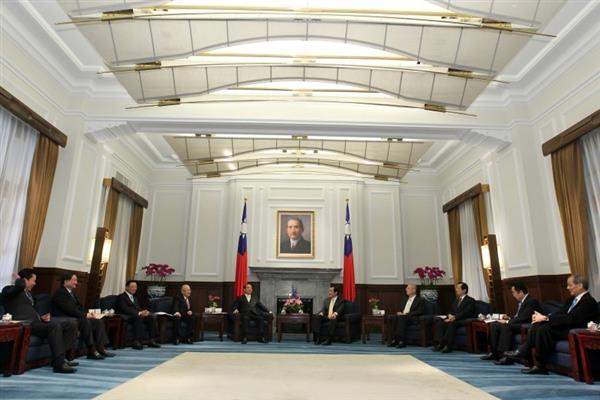News & activities
 News releases
News releases
President Ma Ying-jeou met on the morning of April 20 with an ROC delegation, led by Legislative Yuan President Wang Jin-pyng, which was preparing to leave in the afternoon for Japan to express Taiwan's condolences in the wake of the disaster, and to convey the concerns of the government and people of the ROC. The president expressed his best wishes for the future recovery and reconstruction of areas impacted by the disaster.
The president remarked that Wang is the head of the ROC's highest elected body. Other members of the delegation include Chiang Pin-kung and Yiin Chii-ming, who are the deputy heads of the delegation, as well as Lee Hung-Chun, C.V. Chen, Hank Du, Hsieh Ching-kuei, Theodore M.H. Huang, Jason C.S. Lin, and Rock Hsu, all of whom are representatives of important private groups or the heads of major companies. Many of them maintain close ties with and have a deep understanding of Japan, making the group quite representative, he said. The president asked the group to pass along the concern of the people of Taiwan for Japan, and to help promote even stronger ties between the two countries.
President Ma noted the tragic loss of life caused by the disaster, pointing to official Japanese statistics released on April 18 indicating that over 13,000 people have died, over 14,000 are missing, and more than 13,000 others are being housed in shelters. The president said that the number of deaths and missing persons in this disaster is 11 times that experienced by Taiwan after the September 21, 1999 earthquake and is 40 times that caused by Typhoon Morakot in 2009. President Ma commented that relations between Taiwan and Japan have long been quite friendly and the two countries maintain close ties. Japan immediately provided assistance to Taiwan after the September 1999 earthquake and Typhoon Morakot, so Taiwan must make every effort to assist its northern neighbor in the wake of this enormous disaster. The president stated that immediately following the disaster he instructed the ROC's representative to Japan, John C.T. Feng, to express the concern and condolences of Taiwan to Japanese Prime Minister Naoto Kan. The Red Cross Society of the ROC, World Vision Taiwan, and Tzu Chi were among the private groups that began staging fundraising drives, and local donations to date have exceeded NT$5 billion, making Taiwan the largest donor nation in the world. He noted that the Japanese media has made prominent mention of this, and thanked the people of Taiwan for their deep compassion for their Japanese brethren.
President Ma also remarked that significant progress has been seen on many fronts in relations between the two countries in recent years. The ROC has opened a new representative office in Sapporo, and direct flights have commenced between Taipei's Songshan Airport and Tokyo's Haneda Airport. Most recently, he said, Japan's parliament, the Diet, has passed legislation that protects foreign artworks on display in Japan from being impounded. This law will help pave the way for Taiwan's National Palace Museum to display items from its collection in Japan, he said, adding that the museum is currently involved in planning such an exhibit. The president also called for Japanese treasures to be exhibited in Taiwan, so as to take cultural ties between the two sides to a new level.



